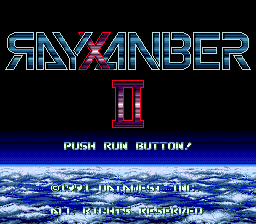Rayxanber
II is the middle game in Data West's Rayxanber series. Heavily influenced
by the R-Type school (as opposed to, say, the Gradius or Thunderforce
school) of horizontal shooter thought, Rayxanber II features a lot
of exacting path memorization and weapons that you simply can't
power up to a level that overwhelms the invading army of alien imperials.
(In fact, the best you can hope for in many cases is to get the
final shot in before a sturdy craft -- or the caravan of three behind
it -- fly at full speed through your ship.) One of the game's interesting
features is a speed burst, which gives your ship a temporary boost
out of harms way, or -- more often than one would hope -- straight
into harm's way, at which point harm smacks you down and sends you
to some previous spot in the level without allowing time for you
to pack for for the trip. Most of the time, you won't use the speed
burst, but there are a few spots in the game you cannot pass without
mastering it.
In
general, Rayxanber II plays two to three speed-ups faster than games
that start with a factory issue R-9 or Vic Viper. Since the game
also requires that you be constantly on the move from one soon-to-be-gone
safe spot to the next, and the weapon power-ups really provide defensive,
rather than offensive, firepower, Rayxanber II is often far more
frustrating than it is fun. If you're a big fan of R-Type and want
a greater challenge, seriously consider spending some (read: a LOT
of) time with the game. If R-Type isn't your thing, spend your time
completing your Konami or Technosoft collections. (If you get Rayxanber
II anyway, you'll probably wind up hating it and will likely spend
a long period of time contemplating the most innovative way to end
the CDs existence.)
If
you're still interested in Rayxanber II, know the following: Your
weapons only have one power-up level. You can power them up and
release a special attack, but it's often not worth it: charged attack
doesn't really give you extra power; rather, it allows your weapon
to attack in a different direction.
If
rather weak weapons don't deter you, perhaps it should. The alien
empire you face has makes its ships with sturdiness in mind. You'll
have to hit most enemies multiple times to destroy them, regardless
of the weapon you choose. Fast as your ship is, the enemy ships
are almost always faster than you are, and they are content to run
patterns that force you to run into either one of their ships or
a "safe spot" that suddenly teems with a new set of enemies. If
you don't know where to be at all times, you won't get very far
-- certainly not past the third level. (I never got past the fourth
boss until Magic Engine's save state came along, though I wholeheartedly
recommend playing this game on a real Turbo or PCE CD2 or System
3.0 console: your PC may not be able to process the game in real
time.)
Something
worth noting about the level bosses: they aren't particularly strong.
You mostly have to dodge their weapons, which can be a near-insanity-inducingly
frustrating task, shoot an orb (or similar object) that moves faster
than you can, making it hard to get a clear shot, and keep track
of the bosses' attack sequences and such. Actually making it to
any of the later bosses (levels four, five, and six) is a remarkable
feat, defeating one of them even moreso.
Rayxanber
II supplies you with infinite continues, and they are are essential.
Each continue starts you at the beginning of the level you were
on when you died, and you are given three lives per continue. Between
each continue, there are three places you can start when you die,
depending on how far you got in the level: the beginning, the middle,
and the boss. Assuming you can even get to the level boss, it'll
probably still take a number of trips for you to understand its
attack patterns and learning the safe spot that will provide you
with protection (that is until it suddenly moves somewhere else
and you realize you've just been fried by a huge energy blast).
Moving
beyond gameplay, Rayxanber II isn't too shabby. The graphics are
well-detailed. Parallax is used, though no engaging 3D effect is
achieved. It is difficult to distinguish the background from the
foreground on the last level, because they share the same color
palette. Flicker occasionally shows up, though I've never known
it to be a major problem. (Then again, I never made it past the
fourth level without "assistance.")
At
the end of each level, the screen goes blank; when it fades back
in, you are facing the boss. This change is made even more abrupt
because the music (which is mostly forgettable) doesn't fade: it
cuts. This doesn't affect gameplay but is nonetheless slightly annoying.
In
the end, Rayxanber II is all about where to be . . . and when. If
you can't (or don't want to) memorize a rigid -- and convoluted
-- path through each level and follow it every time you play, the
game will likely frustrate you to no end by the third or fourth
level. If this isn't your thing, avoid the game at all costs. If
this sounds fun, however, Rayxanber II is the challenge you've been
looking for.















